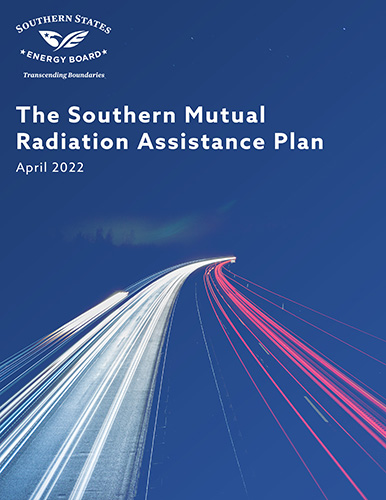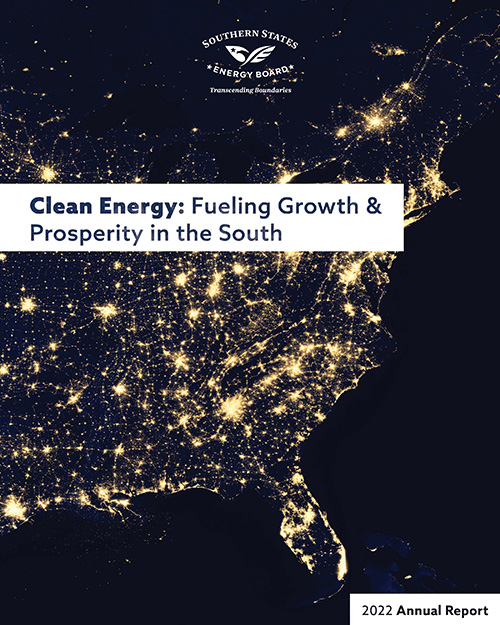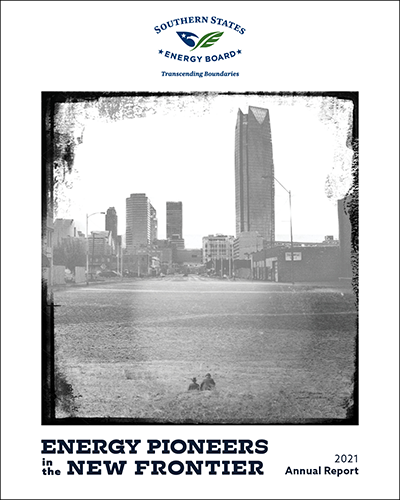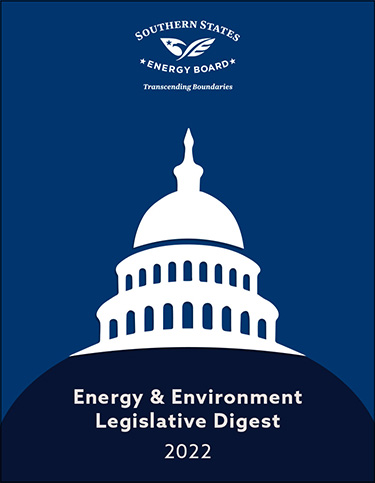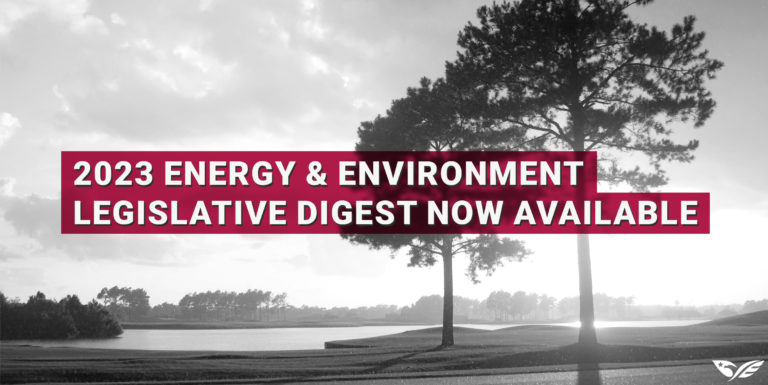Review our 2022 Preliminary Digest
Our 2022 Preliminary Legislative Digest is now available! The Digest collects all energy and environmental (E&E) legislation enacted by the Board’s 18 member states and territories during their 2022 legislative sessions as well as some notable E&E bills from outside our membership.
For the first time, we have collected passed bills and posted them in an interactive format online. As more measures pass, they will automatically appear in the Interactive Digest. The printed Preliminary Digest is still available for those who prefer it—a final version will be available at our upcoming 62nd Annual Meeting.
We invite you to read the Digest’s introduction from our Vice Chair excerpted below:
As the Vice-Chair of the Southern States Energy Board, I’m honored to introduce the Preliminary Energy & Environment Legislative Digest: a compendium of energy and environmental legislation enacted by the Board’s 18 member states and territories during their 2022 legislative sessions.
For more than four decades, the Southern States Energy Board has published this Digest, and each year the Board endeavors to ensure that the information representing the legislative trends in its member states is accurate and comprehensive. The legislation presented in this preliminary document is current through June 20, 2022.
Any additions should be noted to SSEB staff prior to the publication of the final version that will be published ahead of our 62nd Annual Meeting in Charleston, South Carolina, which begins August 28, 2022. We’ve also included a selection of notable bills from around the nation in this edition.
This year, our legislative members passed a total of 517 bills. At the time of publication, North Carolina, Puerto Rico, and the U.S. Virgin Islands remain in session. Texas holds legislative sessions on odd-numbered years, though a special session may involve E&E bills. Arkansas passes only appropriations-specific bills on even-numbered years, but we continue to monitor for special session bills there as well.
We expect to add additional legislation to the final version of the Digest, but, in a first for Southern States Energy Board, you can now review an updated index of bills as they are passed on our website—there you can analyze passed bills using interactive maps. Bills are divided into categories and organized using maps to provide a quick reference as to the actions of our member states on related issues. Due to the nature of legislative reporting from Puerto Rico and the U.S. Virgin Islands, they each have their own pages of passed E&E bills.
Precise bill summaries are categorized for easy comparison. Some bills may cover a wide variety of issues and fall into multiple categories. In order to keep the size of the printed publication reasonable, we strive to place bills in their most relevant category, but if you utilize our interactive Digest online, you will find that bills may fall into multiple categories. We’ve also made some revisions to our categories this year to allow for more broad comparisons of legislation between our member states and the nation as a whole.
Energy measures are divided among the following categories: Carbon Capture & Storage, Critical Minerals & Rare Earth Elements, Cybersecurity & Digital Technology, Efficiency & Weatherization, Emergency Management and Homeland Security, Fossil Energy, Nuclear Energy, Renewable Energy, Reorganization & Coordination, and Utilities. Thus far, 254 energy-related bills have passed this year in our member states and territories.
Environmental measures are divided into the following categories: Coastal Zone Management, Emergency Management and Homeland Security, Emissions & Pollution, Environmental Health & Justice, Hazardous Waste, Inland Water Quality & Management, Land Management, Reorganization & Coordination, and Solid Waste. These categories combined for 263 pieces of legislation.
This year, several trends emerged in our member states. In the energy realm, hydrogen, nuclear, and renewable power measures saw a surge. As with previous years, flood mitigation, environmental remediation, and emergency planning and response were key environmental legislative trends.
Nationwide, we observed an influx of bills supporting the development of hydrogen production. Because hydrogen can be produced with both fossil and renewable energy, many of those bills have been placed in both the Fossil Energy and Renewable Energy categories. Our members in Alabama, Florida, Maryland, Oklahoma, and Tennessee all passed laws related to hydrogen storage, development, or related technologies.
Our region also passed the highest number of nuclear-related bills in the last decade. A renewed interest in spurring nuclear energy development and deployment has swept over the Southeast and many other states around the nation. Louisiana, Mississippi, Tennessee, Virginia, and West Virginia all enacted legislation either governing or encouraging nuclear energy development.
With decarbonization goals driving energy technology development, many states addressed the capture and storage of carbon dioxide. Alabama, Louisiana, Mississippi, Oklahoma, Tennessee, and West Virginia all passed such laws.
As electric vehicle (EV) adoption continues to grow, we’ve seen many legislative measures addressing EV infrastructure deployment and taxation surrounding their use, and this year was no different. Kentucky, Louisiana, Maryland, Mississippi, South Carolina, Virginia, and West Virginia all passed laws affecting EV fees and infrastructure development.
We’ve also observed many trends continuing from last year in the solid waste category, including the regulation of catalytic converter recycling and advanced recycling definitions and rules. Alabama, Kentucky, Louisiana, South Carolina, Virginia, and West Virginia passed measures on such matters.
A focus on deadly pollutants such as lead also found its way into the halls of many legislatures. Alabama, Georgia, Maryland, and Virginia all passed legislation addressing lead exposure mitigation.
In response to the Russian war against Ukraine, many states passed laws banning Russian oil and petroleum imports and adopted related resolutions urging Congress to fill the gap by strengthening our domestic production. Louisiana, Missouri, Mississippi, North Carolina, Tennessee, and West Virginia all passed laws related to such prohibitions or calls for strengthened domestic energy security.
Finally, legislatures across our region passed a bevy of laws regarding solar and wind energy development and deployment. Florida, Louisiana, Maryland, Puerto Rico, South Carolina, Tennessee, and Virginia all passed laws regulating or encouraging the growth of solar and wind generation.
I want to thank you again for taking the time to review this preliminary version of the Digest, and I hope that you take some time to utilize our new interactive list of passed bills on our website.
Georgia Rep. Lynn Smith, SSEB Vice Chair

